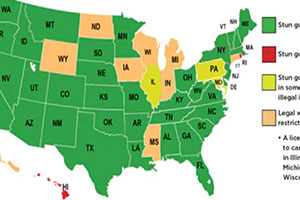Are Radar Detectors legal in the U.S?
Q&A | by
Navigating the legal landscape of radar detector usage in the United States can be a complex endeavor, as laws vary significantly across jurisdictions. Radar detectors, devices designed to alert drivers of law enforcement’s use of radar to monitor vehicle speed, occupy a contentious space in traffic law. This article provides an in-depth look at the legality of radar detectors in the U.S., highlighting federal regulations, state-specific laws, and key considerations for drivers.
Federal Regulations
At the federal level, the use of radar detectors is primarily governed by the Communications Act of 1934, as amended by the Wireless Ship Act of 1936, which addresses the operation of radio transmitters and receivers.
Communications Act of 1934, as amended: “The Act allows for the use of devices capable of receiving radio communications, including those used by law enforcement, provided they do not interfere with licensed radio communications.”
However, federal law expressly prohibits the use of radar detectors in commercial vehicles over 10,000 pounds and all vehicles on federal property, such as military bases and national parks.
State Laws
The legality of radar detectors varies significantly from state to state, with most states allowing their use in private vehicles but a few imposing restrictions or outright bans.
- Virginia and Washington D.C.: Both jurisdictions have laws explicitly prohibiting the use of radar detectors. Violations can result in fines and confiscation of the device.
- California and Minnesota: While not banning radar detectors outright, these states have laws against affixing objects to the windshield that can obstruct the driver’s view, which can include radar detectors.
Example: “In Virginia, the Code of Virginia § 46.2-1079 prohibits the use of radar detectors in any motor vehicle.”
Commercial Vehicles
The use of radar detectors in commercial vehicles is regulated at both the federal and state levels. Federal Motor Carrier Safety Regulations prohibit the use of radar detectors in vehicles over 10,000 pounds engaged in interstate commerce.
Federal Motor Carrier Safety Regulations: “The use of radar detectors in any commercial vehicle used for interstate commerce is prohibited.”
Enforcement and Penalties
Enforcement of radar detector laws varies by jurisdiction, with penalties ranging from fines to points on the driver’s license or even confiscation of the device. In jurisdictions where radar detectors are legal, law enforcement may still use radar detector detectors (RDDs) to identify vehicles using radar detectors, though the use of RDDs is itself subject to legal debate.
Conclusion
The question of whether radar detectors are legal in the U.S. does not have a one-size-fits-all answer. While federal law permits their use under certain conditions, state laws vary widely, with some states imposing strict bans and others offering more leniency. Drivers who choose to use radar detectors must familiarize themselves with the laws of the states in which they drive to ensure compliance and avoid penalties.
References
- Communications Act of 1934: https://www.fcc.gov/general/communications-act-1934
- Federal Motor Carrier Safety Administration Regulations: https://www.fmcsa.dot.gov/regulations
- Code of Virginia § 46.2-1079: https://law.lis.virginia.gov/vacode/title46.2/chapter10/section46.2-1079/









